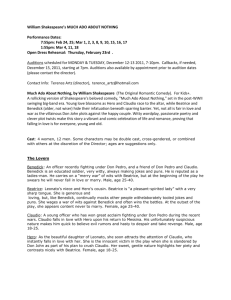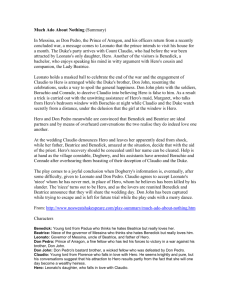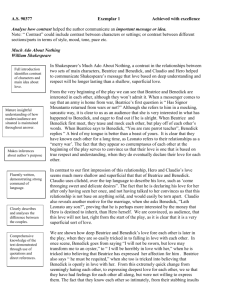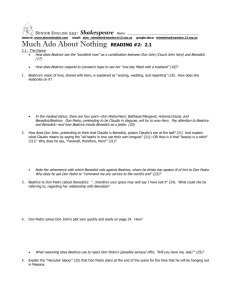Q: Consider the differences and similarities between the characters
advertisement
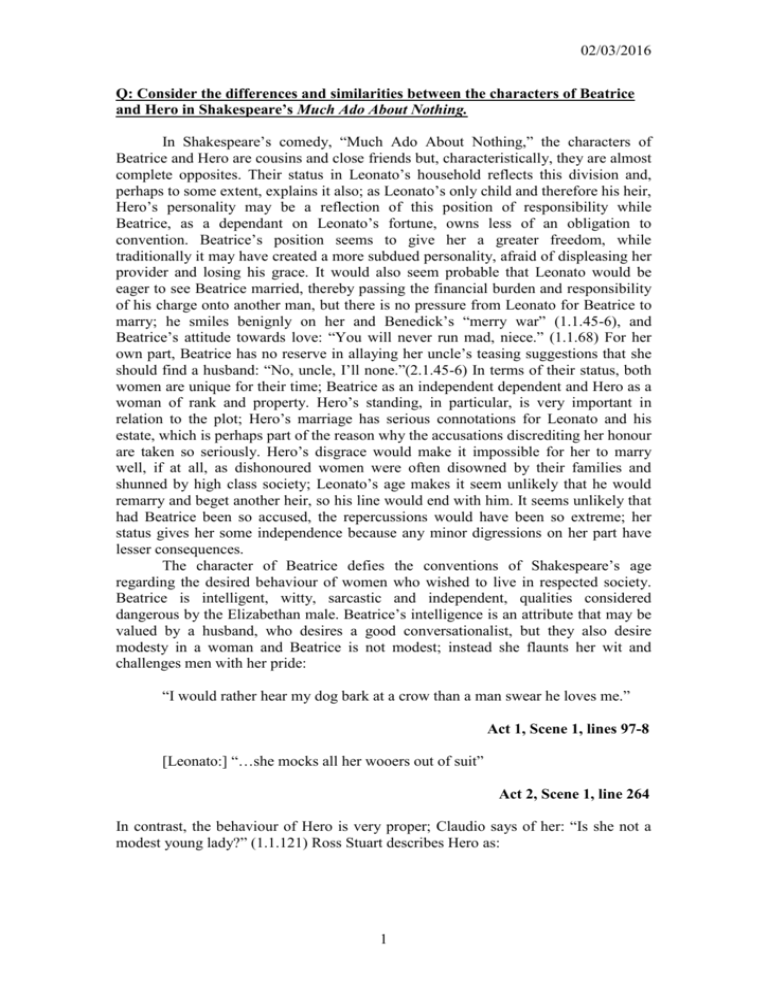
02/03/2016 Q: Consider the differences and similarities between the characters of Beatrice and Hero in Shakespeare’s Much Ado About Nothing. In Shakespeare’s comedy, “Much Ado About Nothing,” the characters of Beatrice and Hero are cousins and close friends but, characteristically, they are almost complete opposites. Their status in Leonato’s household reflects this division and, perhaps to some extent, explains it also; as Leonato’s only child and therefore his heir, Hero’s personality may be a reflection of this position of responsibility while Beatrice, as a dependant on Leonato’s fortune, owns less of an obligation to convention. Beatrice’s position seems to give her a greater freedom, while traditionally it may have created a more subdued personality, afraid of displeasing her provider and losing his grace. It would also seem probable that Leonato would be eager to see Beatrice married, thereby passing the financial burden and responsibility of his charge onto another man, but there is no pressure from Leonato for Beatrice to marry; he smiles benignly on her and Benedick’s “merry war” (1.1.45-6), and Beatrice’s attitude towards love: “You will never run mad, niece.” (1.1.68) For her own part, Beatrice has no reserve in allaying her uncle’s teasing suggestions that she should find a husband: “No, uncle, I’ll none.”(2.1.45-6) In terms of their status, both women are unique for their time; Beatrice as an independent dependent and Hero as a woman of rank and property. Hero’s standing, in particular, is very important in relation to the plot; Hero’s marriage has serious connotations for Leonato and his estate, which is perhaps part of the reason why the accusations discrediting her honour are taken so seriously. Hero’s disgrace would make it impossible for her to marry well, if at all, as dishonoured women were often disowned by their families and shunned by high class society; Leonato’s age makes it seem unlikely that he would remarry and beget another heir, so his line would end with him. It seems unlikely that had Beatrice been so accused, the repercussions would have been so extreme; her status gives her some independence because any minor digressions on her part have lesser consequences. The character of Beatrice defies the conventions of Shakespeare’s age regarding the desired behaviour of women who wished to live in respected society. Beatrice is intelligent, witty, sarcastic and independent, qualities considered dangerous by the Elizabethan male. Beatrice’s intelligence is an attribute that may be valued by a husband, who desires a good conversationalist, but they also desire modesty in a woman and Beatrice is not modest; instead she flaunts her wit and challenges men with her pride: “I would rather hear my dog bark at a crow than a man swear he loves me.” Act 1, Scene 1, lines 97-8 [Leonato:] “…she mocks all her wooers out of suit” Act 2, Scene 1, line 264 In contrast, the behaviour of Hero is very proper; Claudio says of her: “Is she not a modest young lady?” (1.1.121) Ross Stuart describes Hero as: 1 02/03/2016 “a conventional, romantic heroine, exemplary in her patience and forgiveness.” From “York Notes Advanced,” page 61 Our perception of Hero is based mainly on what the other characters say about her, rather than her own utterances. An actress playing Hero has the challenge of expressing her emotions with very little dialogue to work with, and Hero is essential to the plot; although Beatrice has more to say than Hero and is involved in most of the scenes, but she is not a catalyst for action in the same way. This could be indicative of Beatrice’s humbler status; her position and influence are too lowly to inspire plots to discredit her. Both Beatrice and Hero are beautiful women; the evidence for this is provided by Benedick’s descriptions in the first scene and, despite the animosity between them, he obviously favours Beatrice: “her cousin [Beatrice]…….exceeds her [Hero] as much in beauty as the first of May doth the last of December.” Act 1, Scene 1, lines 141-2 His description of Hero is slightly less gracious: “…were she other than she is, she were unhandsome.” Act 1, Scene 1, lines 128-9 Hero is objectified by the male characters: [Claudio:] “Can the world buy such a jewel?” (1.1.134), this implies that he regards Hero as a beautiful object; something to sit and be admired but without any actual purpose. When Claudio asks Benedick for his opinion of Hero, he lists her physical attributes: “too low,” “too brown,” “too little,” (1.1.126-7) but fails to mention anything about her intellect, her interests or her personality. Hero’s inheritance makes her incredibly desirable to potential suitors as the law of the time stated that, upon her marriage, a woman’s property becomes that of her husband. Hero is highly influenced by her father, which could explain why she expresses herself so little; Leonato has the final decision in all important matters. In the first scene of the second act, he mentions potential marriage proposals: “Daughter, remember what I told you: if the prince do solicit you in that kind, you know your answer.” Act 2, Scene 1, lines 48-9 Hero only becomes more assertive when her engagement to Claudio is official, expressing her happiness freely; this may be because she feels it is now safe to do so as she has her father’s approval. In this characteristic, she and Beatrice are complete opposites; Hero acts to please others while Beatrice acts to the order of her own conscience and encourages her cousin to do the same: 2 02/03/2016 “…it is my cousin’s duty to make curtsy, and say, father, as it please you: but yet for all that, cousin, let him be a handsome fellow, or else make another curtsy, and say, father, as it please me.” Act 2, Scene 1, lines 39-41 Beatrice and Hero also differ on another aspect central to the play: their attitude to men, however not predictable. It is true that Beatrice is stridently opposed to marriage and Hero longs to be Claudio’s wife, but Beatrice’s language seems to hint at a past relationship and a knowledge of men, while Hero is completely innocent and naïve. When Beatrice argues with Benedick she angrily states: “I know you of old” (1.1.107) and, in the first scene of the second act, she says to Don Pedro about Benedick: “…marry once before he won it [her heart] of me with false dice” Act 2, Scene 1, lines 212-3 This implies that she loved Benedick once but he betrayed her. Also, in another of Beatrice’s bantering speeches, she jokes about going to Heaven and living with the bachelors “as merry as the day is long.” Hero’s “innocence” in terms of her physical virginity is in no doubt, despite the princes’ accusations; of men she is adamant that “I know none.” (4.1.170) Her naivety is apparent in the ease in which she forgives Claudio, who was so quick to judge her guilty, and in her confusion when he accuses her, how she tries to excuse his behaviour: “Is my lord well, that he doth speak so wide?” Act 4, Scene 1, line 56 Though very different characters, Beatrice and Hero are close to each other; their differences are complementary rather than conflicting. Beatrice’s devotion to her cousin is apparent when she charges Benedick to challenge Claudio in the fourth act in order to avenge Hero’s honour. Hero repays her by forcing her to admit to Benedick that she loves him and accept his proposal. When Hero is cruelly humiliated at her own wedding, even her father sides with Claudio and Don Pedro; it is Beatrice who defends her: “Oh on my soul my cousin is belied.” (4.1.139) An explanation for their close relationship could be that in such a male dominated society where men have the power and support each other, women need to protect themselves by sticking together. 3 02/03/2016 Bibliography: Shakespeare, William - Much Ado About Nothing Cambridge University Press, 1988 Stuart, Ross - York Notes Advanced: Much Ado About Nothing – William Shakespeare York Press, 1997 4




